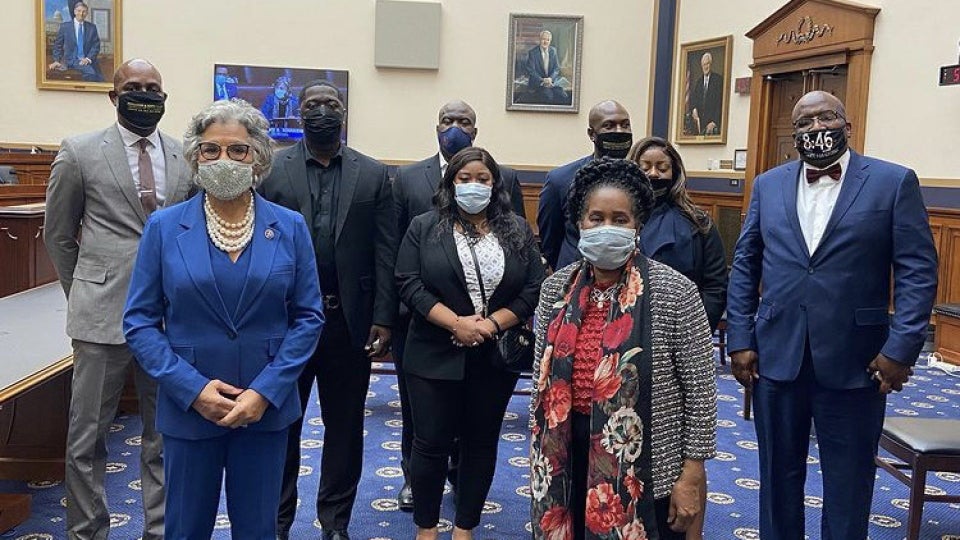

With family members of the late George Floyd present for the vote, the U.S. House of Representatives passed a sweeping police reform bill on Wednesday night. It’s named for the Black man whose police killing last May in Minneapolis ignited anew national and global protests, demanding change. The George Floyd Justice in Policing Act of 2021 (H.R. 1280) passed the House, mostly along party lines. Rep. Karen Bass (D-CA) and House Judiciary Committee Chair Jerrold Nadler (D-NY) reintroduced the bill last week, and led the House effort. So did the Congressional Black Caucus (CBC), which has prioritized its passage in their legislative agenda.
Congresswoman Bass reflected that 30 years ago this month, Rodney King was viciously beaten by police officers in Los Angeles.
“It would be the first time the world would witness what African Americans had been organizing, marching and trying to change for more than 100 years,” she said. “Personally, I was hopeful that once everyone saw what happens in Black communities, policing in America would change. I was certain no one would deny what they saw with their own eyes and the officers involved would be held accountable for their actions. I was wrong.” In spite of that, Bass remains hopeful that three decades later, the House vote will lead to permanent change. The legislation, she said, is “just the first step to transform policing in America by raising the standards for policing in America, and holding officers who fail to uphold the ethic of protecting and serving their communities, accountable.”
Rep. Joyce Beatty (D-OH), chair of the Congressional Black Caucus (CBC), was among Black lawmakers who spoke on the House floor. “Madam Speaker, 8 minutes, 46 seconds on George Floyd’s neck. I can’t breathe,” she said, citing the names of Floyd, Breonna Taylor, and countless other Black men, women and children killed by police. Rep. Sheila Jackson Lee (D-TX) hosted some of Floyd’s relatives. Floyd was born in North Carolina, but grew up in Houston, Texas.
“This George Floyd Justice in Policing Act is a crucial overhaul of community-police relationships,” Jackson Lee said. “It will reinforce justice and fairness for all parties involved, and families will get justice, and we will be able to have an American police community that will be a living example of their oath to protect and serve.” Rep. Barbara Lee (D-CA) spoke of her role as a member of Congress, who is also the mother and grandmother of Black men and boys. “I had many painful conversations—as all Black families do—about what to do to make sure their encounters with the police were not deadly. The trauma around these fears is lifelong and should not be normalized,” said Lee.
“Far too many Black and Brown people have had their lives cut short because of a rotten system. This bill is the first step towards justice for so many families who have been traumatized and torn apart due to wrongful, unchecked, aggressive policing.” Among other provisions, The Justice in Policing Act would establish a national standard for the operation of police departments; mandate data collection on police encounters; and reprogram existing funds to invest in transformative community-based policing programs. It would also streamline federal law to prosecute excessive force and establish independent prosecutors for police investigations and more. Not every Black member of the House voted to support the bill. Rep. Byron Donalds (R-FL), a freshman member, issued a statement saying the measure is “nothing more than a measure to defund, dismantle, and abolish the police.”
“If the Democrats were serious about police reform, they would have supported the JUSTICE Act, which aimed to address police reform and require accountability and transparency in policing. H.R. 1280 is a misguided and dangerous proposal that will do irreparable harm to the communities that need the police the most, communities where I grew up like inner-city Brooklyn. We don’t need less law enforcement; we need more,” Donalds said. He went on to say that, “America’s law enforcement community should not be defined by the bad apples, but by the practices of the many who dutifully serve their communities. Reforms are undoubtedly needed to prevent any malpractice by the men and women entrusted with protecting and serving our communities, but this will not get done with partisan bills like H.R. 1280.” A fight is expected in the U.S. Senate. Sen. Tim Scott, the lone Black Republican in that chamber, put forth a police reform bill in the (last) 116th Congress, which the GOP supported in favor of the Democratic bill, which also passed the House last year.
Any measure will require bi-partisan support. Beatty noted of her Republican colleagues, “the right should read the bill. The right should quote from the bill. Show me the words in the bill to defund the police. I will show you accountability. I will show you transparency. I will show you justice. The American people are calling on Congress to act.” Marc Morial, National Urban League president and CEO, said the Senate “must demonstrate its commitment to racial justice and integrity in policing and send the bill to President Biden’s desk.”
“Every day that goes by without putting these reforms into action is a day when American men, women and children of color remain at risk of racially-motivated violence and injustice. The American people overwhelmingly approve of these reforms. They marched in the street to demand these reforms. They voted for the candidates who are committed to these reforms. They have waited too long already.”